Marketing Effectiveness: A Case Study of Shell Nigeria
VerifiedAdded on 2021/09/22
|18
|4519
|84
Report
AI Summary
This literature review proposal examines the factors influencing marketing effectiveness within Shell Nigeria, focusing on the oil and gas sector. The report explores the significance of marketing, the competitive market landscape, and the impact of operations and supply chain management. It highlights the crucial role of effective marketing in a saturated market, emphasizing the need for businesses to differentiate themselves. The study delves into market competition, analyzing different market structures like oligopoly, and the challenges faced by Shell Nigeria. Furthermore, it investigates the relationship between supply chain management and marketing effectiveness, emphasizing its influence on customer service, cost reduction, and financial performance. The proposal outlines the research questions, objectives, and framework for further investigation into these critical factors, aiming to understand how Shell Nigeria can optimize its marketing strategies to gain a competitive advantage and sustain success in the dynamic business environment.
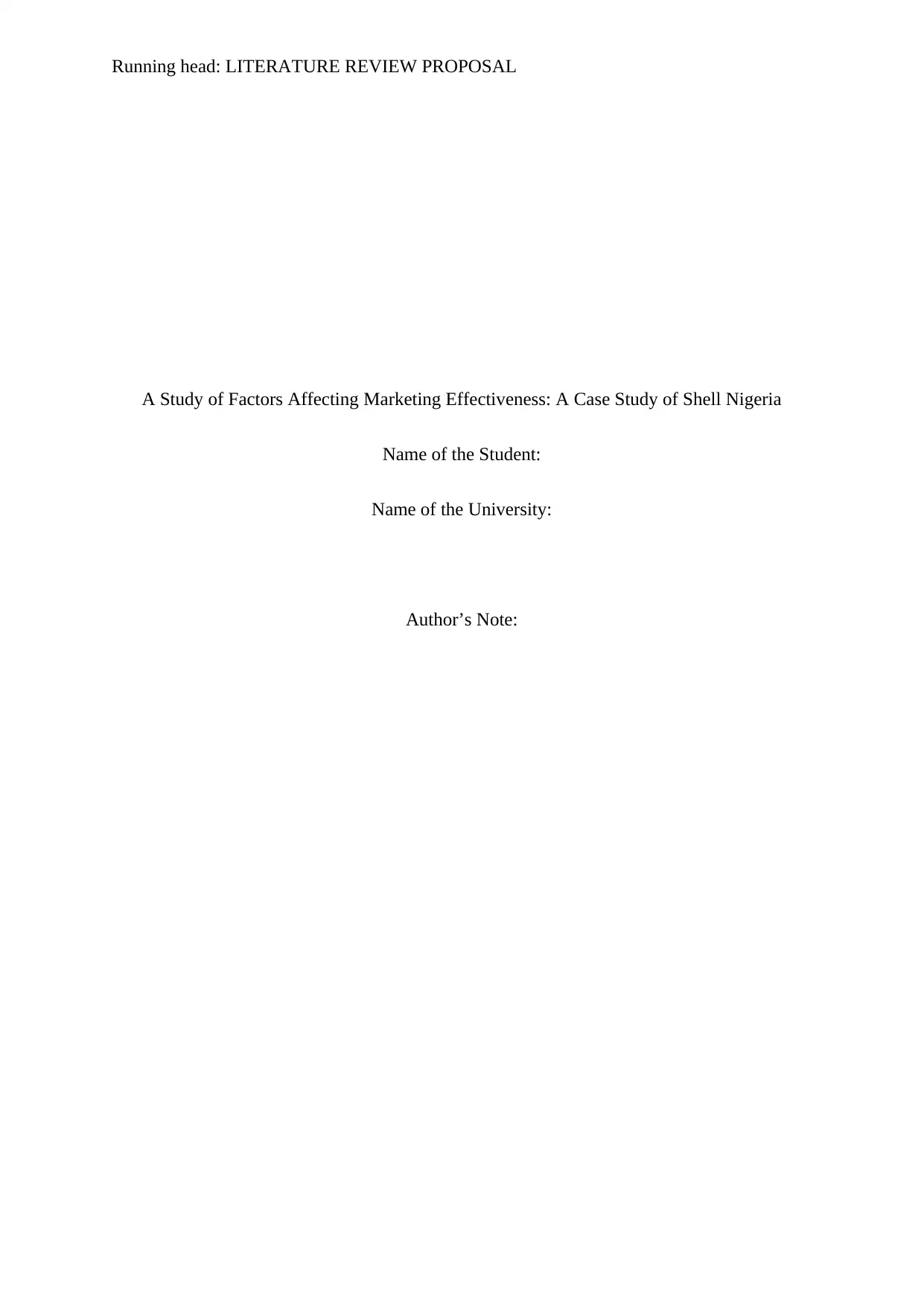
Running head: LITERATURE REVIEW PROPOSAL
A Study of Factors Affecting Marketing Effectiveness: A Case Study of Shell Nigeria
Name of the Student:
Name of the University:
Author’s Note:
A Study of Factors Affecting Marketing Effectiveness: A Case Study of Shell Nigeria
Name of the Student:
Name of the University:
Author’s Note:
Paraphrase This Document
Need a fresh take? Get an instant paraphrase of this document with our AI Paraphraser
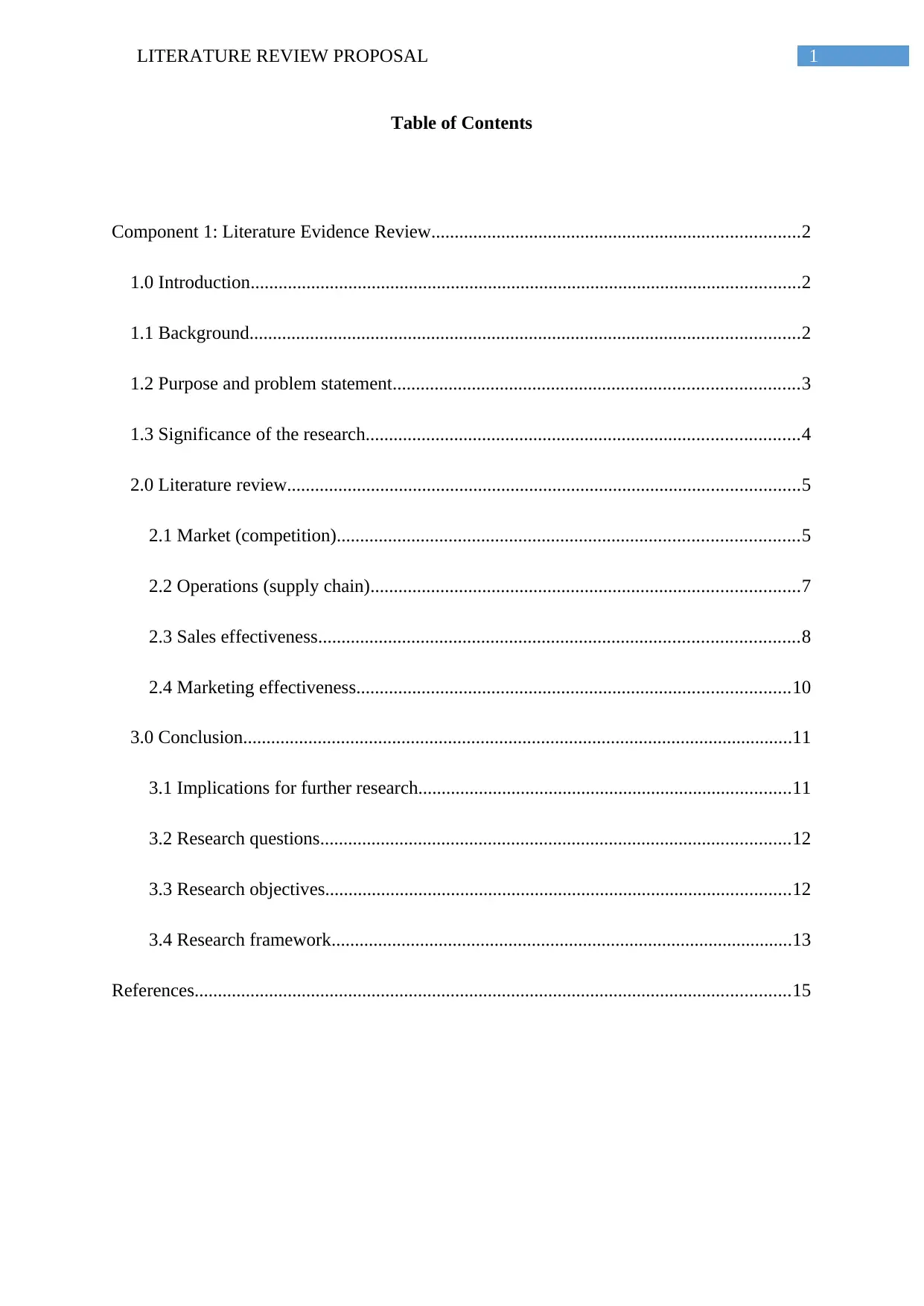
1LITERATURE REVIEW PROPOSAL
Table of Contents
Component 1: Literature Evidence Review...............................................................................2
1.0 Introduction......................................................................................................................2
1.1 Background......................................................................................................................2
1.2 Purpose and problem statement.......................................................................................3
1.3 Significance of the research.............................................................................................4
2.0 Literature review..............................................................................................................5
2.1 Market (competition)...................................................................................................5
2.2 Operations (supply chain)............................................................................................7
2.3 Sales effectiveness.......................................................................................................8
2.4 Marketing effectiveness.............................................................................................10
3.0 Conclusion......................................................................................................................11
3.1 Implications for further research................................................................................11
3.2 Research questions.....................................................................................................12
3.3 Research objectives....................................................................................................12
3.4 Research framework...................................................................................................13
References................................................................................................................................15
Table of Contents
Component 1: Literature Evidence Review...............................................................................2
1.0 Introduction......................................................................................................................2
1.1 Background......................................................................................................................2
1.2 Purpose and problem statement.......................................................................................3
1.3 Significance of the research.............................................................................................4
2.0 Literature review..............................................................................................................5
2.1 Market (competition)...................................................................................................5
2.2 Operations (supply chain)............................................................................................7
2.3 Sales effectiveness.......................................................................................................8
2.4 Marketing effectiveness.............................................................................................10
3.0 Conclusion......................................................................................................................11
3.1 Implications for further research................................................................................11
3.2 Research questions.....................................................................................................12
3.3 Research objectives....................................................................................................12
3.4 Research framework...................................................................................................13
References................................................................................................................................15
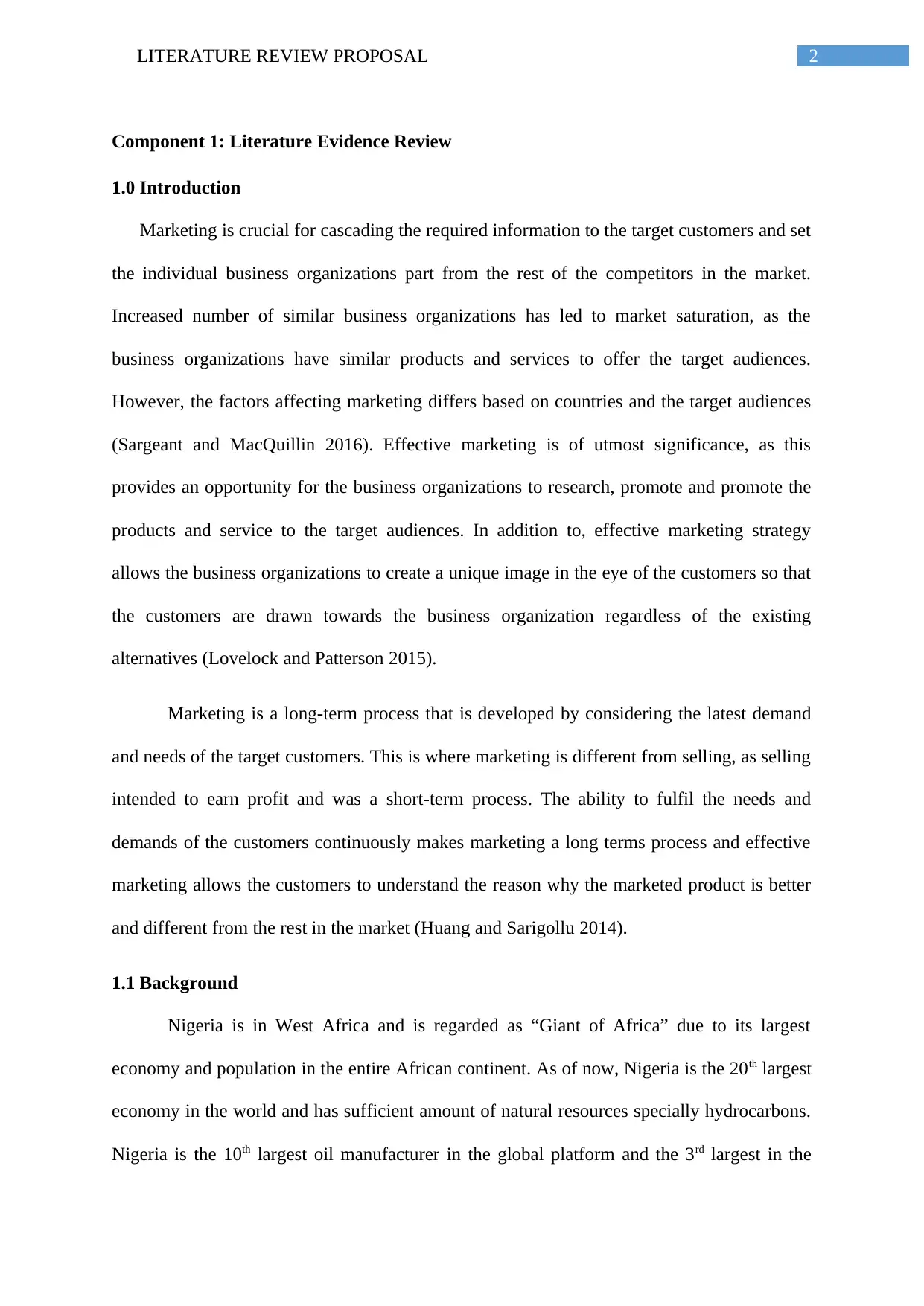
2LITERATURE REVIEW PROPOSAL
Component 1: Literature Evidence Review
1.0 Introduction
Marketing is crucial for cascading the required information to the target customers and set
the individual business organizations part from the rest of the competitors in the market.
Increased number of similar business organizations has led to market saturation, as the
business organizations have similar products and services to offer the target audiences.
However, the factors affecting marketing differs based on countries and the target audiences
(Sargeant and MacQuillin 2016). Effective marketing is of utmost significance, as this
provides an opportunity for the business organizations to research, promote and promote the
products and service to the target audiences. In addition to, effective marketing strategy
allows the business organizations to create a unique image in the eye of the customers so that
the customers are drawn towards the business organization regardless of the existing
alternatives (Lovelock and Patterson 2015).
Marketing is a long-term process that is developed by considering the latest demand
and needs of the target customers. This is where marketing is different from selling, as selling
intended to earn profit and was a short-term process. The ability to fulfil the needs and
demands of the customers continuously makes marketing a long terms process and effective
marketing allows the customers to understand the reason why the marketed product is better
and different from the rest in the market (Huang and Sarigollu 2014).
1.1 Background
Nigeria is in West Africa and is regarded as “Giant of Africa” due to its largest
economy and population in the entire African continent. As of now, Nigeria is the 20th largest
economy in the world and has sufficient amount of natural resources specially hydrocarbons.
Nigeria is the 10th largest oil manufacturer in the global platform and the 3rd largest in the
Component 1: Literature Evidence Review
1.0 Introduction
Marketing is crucial for cascading the required information to the target customers and set
the individual business organizations part from the rest of the competitors in the market.
Increased number of similar business organizations has led to market saturation, as the
business organizations have similar products and services to offer the target audiences.
However, the factors affecting marketing differs based on countries and the target audiences
(Sargeant and MacQuillin 2016). Effective marketing is of utmost significance, as this
provides an opportunity for the business organizations to research, promote and promote the
products and service to the target audiences. In addition to, effective marketing strategy
allows the business organizations to create a unique image in the eye of the customers so that
the customers are drawn towards the business organization regardless of the existing
alternatives (Lovelock and Patterson 2015).
Marketing is a long-term process that is developed by considering the latest demand
and needs of the target customers. This is where marketing is different from selling, as selling
intended to earn profit and was a short-term process. The ability to fulfil the needs and
demands of the customers continuously makes marketing a long terms process and effective
marketing allows the customers to understand the reason why the marketed product is better
and different from the rest in the market (Huang and Sarigollu 2014).
1.1 Background
Nigeria is in West Africa and is regarded as “Giant of Africa” due to its largest
economy and population in the entire African continent. As of now, Nigeria is the 20th largest
economy in the world and has sufficient amount of natural resources specially hydrocarbons.
Nigeria is the 10th largest oil manufacturer in the global platform and the 3rd largest in the
⊘ This is a preview!⊘
Do you want full access?
Subscribe today to unlock all pages.

Trusted by 1+ million students worldwide
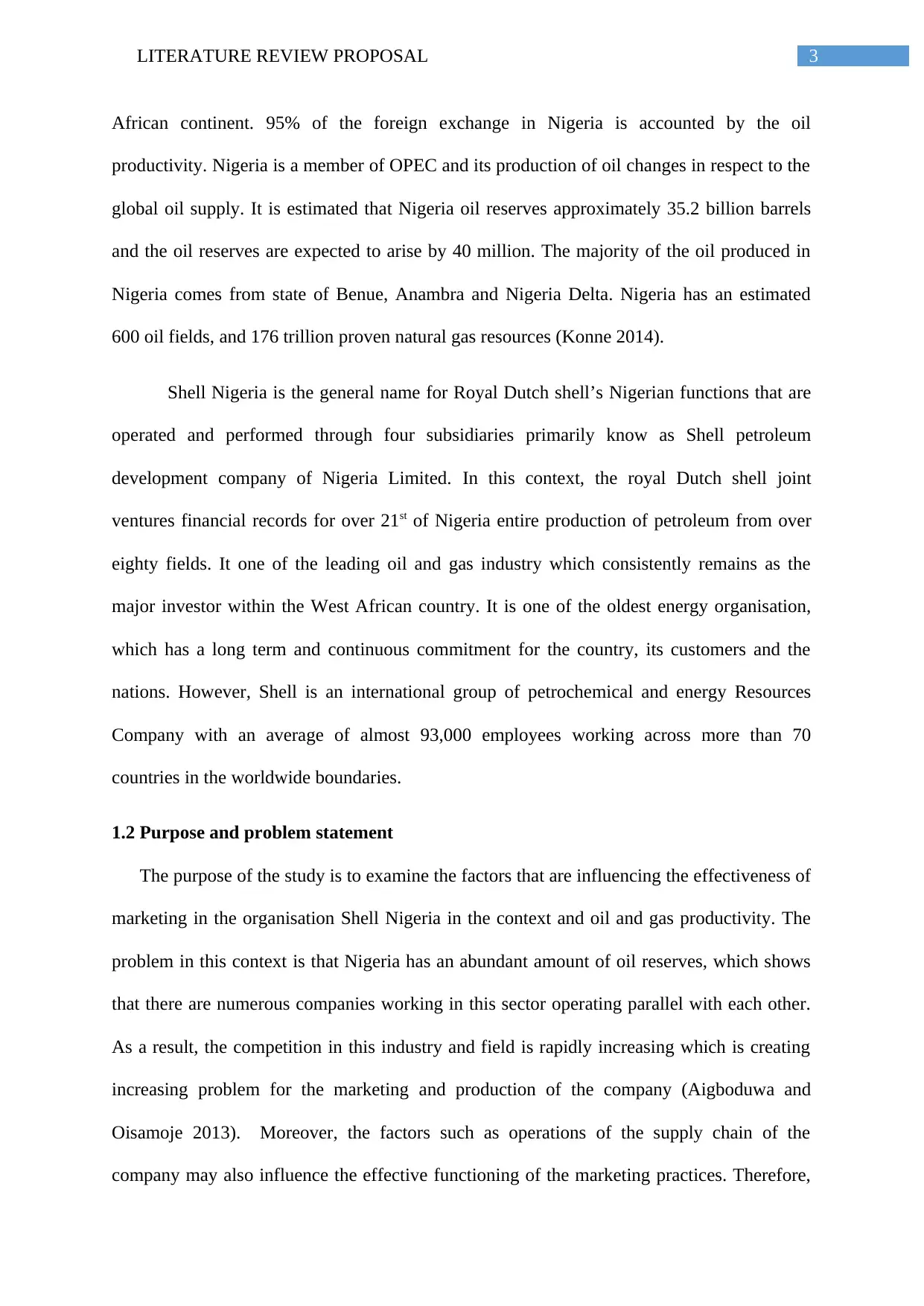
3LITERATURE REVIEW PROPOSAL
African continent. 95% of the foreign exchange in Nigeria is accounted by the oil
productivity. Nigeria is a member of OPEC and its production of oil changes in respect to the
global oil supply. It is estimated that Nigeria oil reserves approximately 35.2 billion barrels
and the oil reserves are expected to arise by 40 million. The majority of the oil produced in
Nigeria comes from state of Benue, Anambra and Nigeria Delta. Nigeria has an estimated
600 oil fields, and 176 trillion proven natural gas resources (Konne 2014).
Shell Nigeria is the general name for Royal Dutch shell’s Nigerian functions that are
operated and performed through four subsidiaries primarily know as Shell petroleum
development company of Nigeria Limited. In this context, the royal Dutch shell joint
ventures financial records for over 21st of Nigeria entire production of petroleum from over
eighty fields. It one of the leading oil and gas industry which consistently remains as the
major investor within the West African country. It is one of the oldest energy organisation,
which has a long term and continuous commitment for the country, its customers and the
nations. However, Shell is an international group of petrochemical and energy Resources
Company with an average of almost 93,000 employees working across more than 70
countries in the worldwide boundaries.
1.2 Purpose and problem statement
The purpose of the study is to examine the factors that are influencing the effectiveness of
marketing in the organisation Shell Nigeria in the context and oil and gas productivity. The
problem in this context is that Nigeria has an abundant amount of oil reserves, which shows
that there are numerous companies working in this sector operating parallel with each other.
As a result, the competition in this industry and field is rapidly increasing which is creating
increasing problem for the marketing and production of the company (Aigboduwa and
Oisamoje 2013). Moreover, the factors such as operations of the supply chain of the
company may also influence the effective functioning of the marketing practices. Therefore,
African continent. 95% of the foreign exchange in Nigeria is accounted by the oil
productivity. Nigeria is a member of OPEC and its production of oil changes in respect to the
global oil supply. It is estimated that Nigeria oil reserves approximately 35.2 billion barrels
and the oil reserves are expected to arise by 40 million. The majority of the oil produced in
Nigeria comes from state of Benue, Anambra and Nigeria Delta. Nigeria has an estimated
600 oil fields, and 176 trillion proven natural gas resources (Konne 2014).
Shell Nigeria is the general name for Royal Dutch shell’s Nigerian functions that are
operated and performed through four subsidiaries primarily know as Shell petroleum
development company of Nigeria Limited. In this context, the royal Dutch shell joint
ventures financial records for over 21st of Nigeria entire production of petroleum from over
eighty fields. It one of the leading oil and gas industry which consistently remains as the
major investor within the West African country. It is one of the oldest energy organisation,
which has a long term and continuous commitment for the country, its customers and the
nations. However, Shell is an international group of petrochemical and energy Resources
Company with an average of almost 93,000 employees working across more than 70
countries in the worldwide boundaries.
1.2 Purpose and problem statement
The purpose of the study is to examine the factors that are influencing the effectiveness of
marketing in the organisation Shell Nigeria in the context and oil and gas productivity. The
problem in this context is that Nigeria has an abundant amount of oil reserves, which shows
that there are numerous companies working in this sector operating parallel with each other.
As a result, the competition in this industry and field is rapidly increasing which is creating
increasing problem for the marketing and production of the company (Aigboduwa and
Oisamoje 2013). Moreover, the factors such as operations of the supply chain of the
company may also influence the effective functioning of the marketing practices. Therefore,
Paraphrase This Document
Need a fresh take? Get an instant paraphrase of this document with our AI Paraphraser
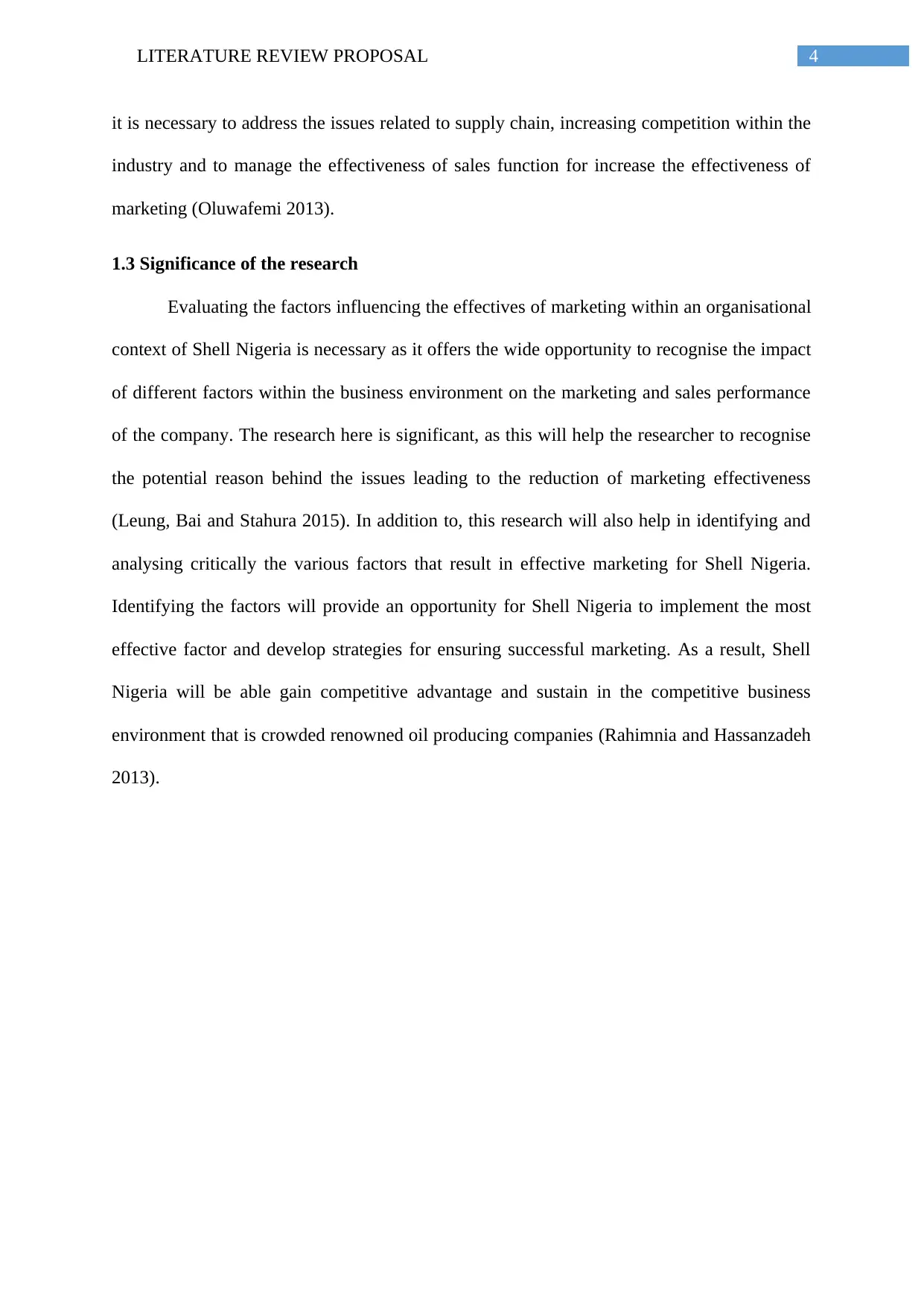
4LITERATURE REVIEW PROPOSAL
it is necessary to address the issues related to supply chain, increasing competition within the
industry and to manage the effectiveness of sales function for increase the effectiveness of
marketing (Oluwafemi 2013).
1.3 Significance of the research
Evaluating the factors influencing the effectives of marketing within an organisational
context of Shell Nigeria is necessary as it offers the wide opportunity to recognise the impact
of different factors within the business environment on the marketing and sales performance
of the company. The research here is significant, as this will help the researcher to recognise
the potential reason behind the issues leading to the reduction of marketing effectiveness
(Leung, Bai and Stahura 2015). In addition to, this research will also help in identifying and
analysing critically the various factors that result in effective marketing for Shell Nigeria.
Identifying the factors will provide an opportunity for Shell Nigeria to implement the most
effective factor and develop strategies for ensuring successful marketing. As a result, Shell
Nigeria will be able gain competitive advantage and sustain in the competitive business
environment that is crowded renowned oil producing companies (Rahimnia and Hassanzadeh
2013).
it is necessary to address the issues related to supply chain, increasing competition within the
industry and to manage the effectiveness of sales function for increase the effectiveness of
marketing (Oluwafemi 2013).
1.3 Significance of the research
Evaluating the factors influencing the effectives of marketing within an organisational
context of Shell Nigeria is necessary as it offers the wide opportunity to recognise the impact
of different factors within the business environment on the marketing and sales performance
of the company. The research here is significant, as this will help the researcher to recognise
the potential reason behind the issues leading to the reduction of marketing effectiveness
(Leung, Bai and Stahura 2015). In addition to, this research will also help in identifying and
analysing critically the various factors that result in effective marketing for Shell Nigeria.
Identifying the factors will provide an opportunity for Shell Nigeria to implement the most
effective factor and develop strategies for ensuring successful marketing. As a result, Shell
Nigeria will be able gain competitive advantage and sustain in the competitive business
environment that is crowded renowned oil producing companies (Rahimnia and Hassanzadeh
2013).
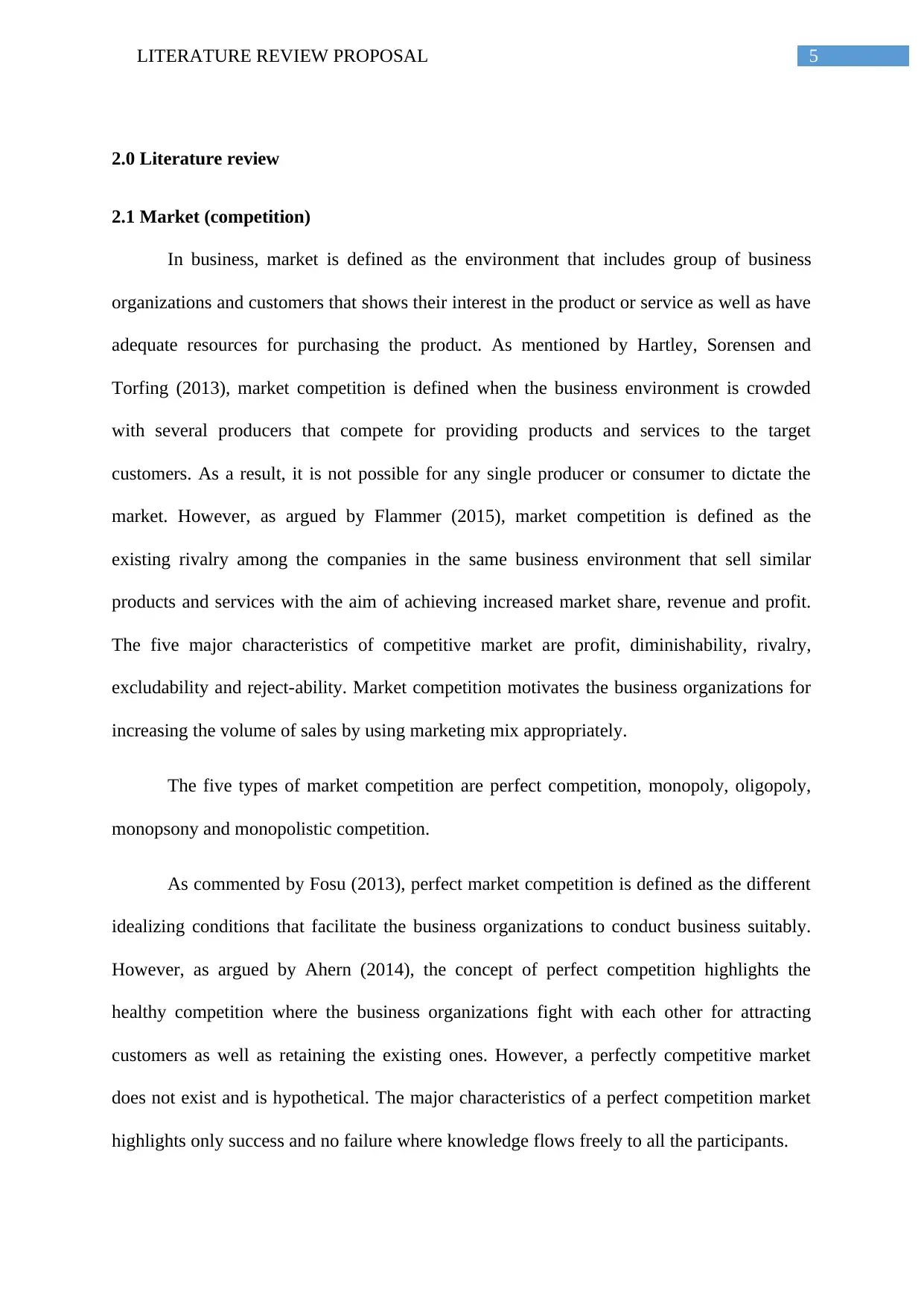
5LITERATURE REVIEW PROPOSAL
2.0 Literature review
2.1 Market (competition)
In business, market is defined as the environment that includes group of business
organizations and customers that shows their interest in the product or service as well as have
adequate resources for purchasing the product. As mentioned by Hartley, Sorensen and
Torfing (2013), market competition is defined when the business environment is crowded
with several producers that compete for providing products and services to the target
customers. As a result, it is not possible for any single producer or consumer to dictate the
market. However, as argued by Flammer (2015), market competition is defined as the
existing rivalry among the companies in the same business environment that sell similar
products and services with the aim of achieving increased market share, revenue and profit.
The five major characteristics of competitive market are profit, diminishability, rivalry,
excludability and reject-ability. Market competition motivates the business organizations for
increasing the volume of sales by using marketing mix appropriately.
The five types of market competition are perfect competition, monopoly, oligopoly,
monopsony and monopolistic competition.
As commented by Fosu (2013), perfect market competition is defined as the different
idealizing conditions that facilitate the business organizations to conduct business suitably.
However, as argued by Ahern (2014), the concept of perfect competition highlights the
healthy competition where the business organizations fight with each other for attracting
customers as well as retaining the existing ones. However, a perfectly competitive market
does not exist and is hypothetical. The major characteristics of a perfect competition market
highlights only success and no failure where knowledge flows freely to all the participants.
2.0 Literature review
2.1 Market (competition)
In business, market is defined as the environment that includes group of business
organizations and customers that shows their interest in the product or service as well as have
adequate resources for purchasing the product. As mentioned by Hartley, Sorensen and
Torfing (2013), market competition is defined when the business environment is crowded
with several producers that compete for providing products and services to the target
customers. As a result, it is not possible for any single producer or consumer to dictate the
market. However, as argued by Flammer (2015), market competition is defined as the
existing rivalry among the companies in the same business environment that sell similar
products and services with the aim of achieving increased market share, revenue and profit.
The five major characteristics of competitive market are profit, diminishability, rivalry,
excludability and reject-ability. Market competition motivates the business organizations for
increasing the volume of sales by using marketing mix appropriately.
The five types of market competition are perfect competition, monopoly, oligopoly,
monopsony and monopolistic competition.
As commented by Fosu (2013), perfect market competition is defined as the different
idealizing conditions that facilitate the business organizations to conduct business suitably.
However, as argued by Ahern (2014), the concept of perfect competition highlights the
healthy competition where the business organizations fight with each other for attracting
customers as well as retaining the existing ones. However, a perfectly competitive market
does not exist and is hypothetical. The major characteristics of a perfect competition market
highlights only success and no failure where knowledge flows freely to all the participants.
⊘ This is a preview!⊘
Do you want full access?
Subscribe today to unlock all pages.

Trusted by 1+ million students worldwide
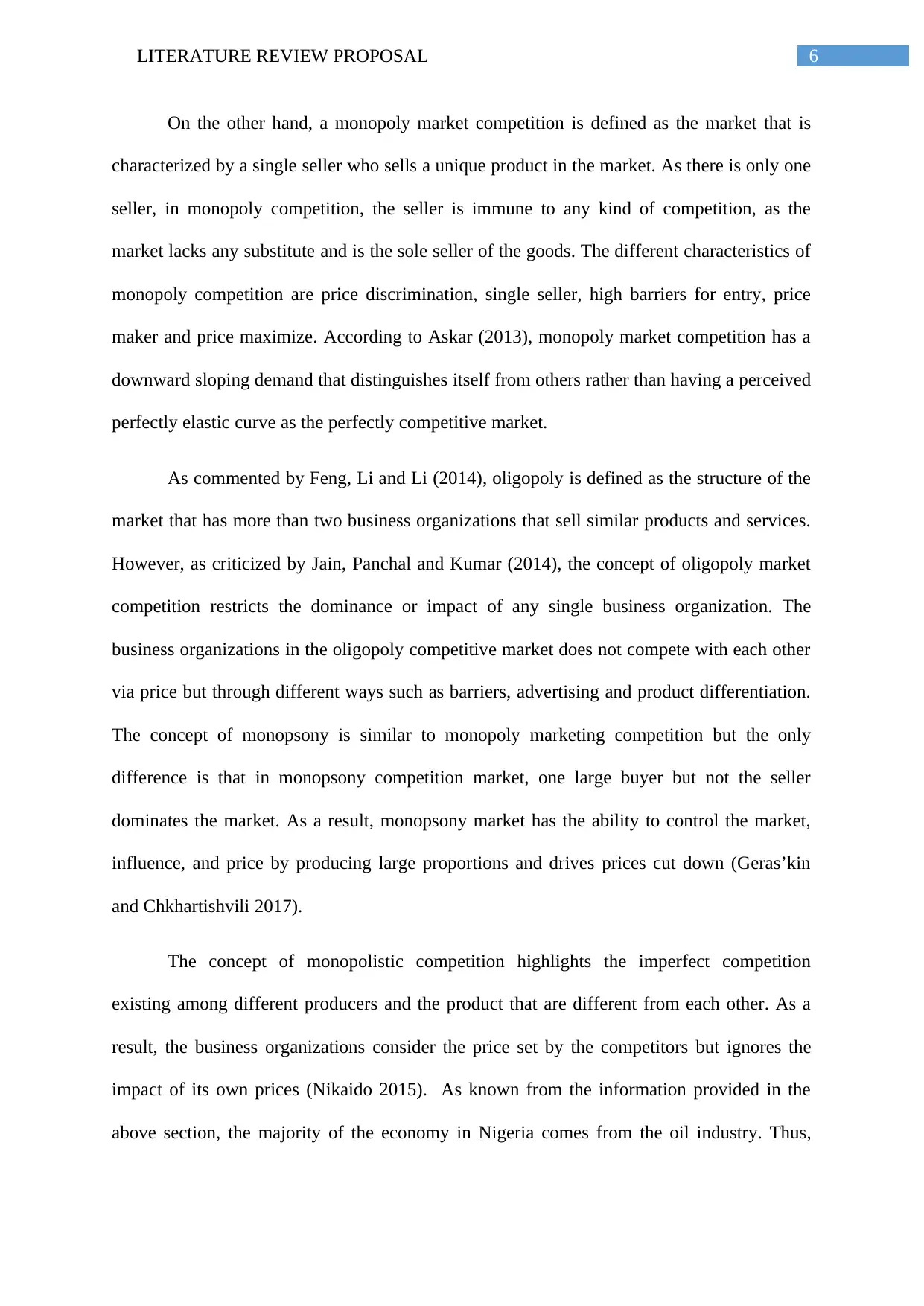
6LITERATURE REVIEW PROPOSAL
On the other hand, a monopoly market competition is defined as the market that is
characterized by a single seller who sells a unique product in the market. As there is only one
seller, in monopoly competition, the seller is immune to any kind of competition, as the
market lacks any substitute and is the sole seller of the goods. The different characteristics of
monopoly competition are price discrimination, single seller, high barriers for entry, price
maker and price maximize. According to Askar (2013), monopoly market competition has a
downward sloping demand that distinguishes itself from others rather than having a perceived
perfectly elastic curve as the perfectly competitive market.
As commented by Feng, Li and Li (2014), oligopoly is defined as the structure of the
market that has more than two business organizations that sell similar products and services.
However, as criticized by Jain, Panchal and Kumar (2014), the concept of oligopoly market
competition restricts the dominance or impact of any single business organization. The
business organizations in the oligopoly competitive market does not compete with each other
via price but through different ways such as barriers, advertising and product differentiation.
The concept of monopsony is similar to monopoly marketing competition but the only
difference is that in monopsony competition market, one large buyer but not the seller
dominates the market. As a result, monopsony market has the ability to control the market,
influence, and price by producing large proportions and drives prices cut down (Geras’kin
and Chkhartishvili 2017).
The concept of monopolistic competition highlights the imperfect competition
existing among different producers and the product that are different from each other. As a
result, the business organizations consider the price set by the competitors but ignores the
impact of its own prices (Nikaido 2015). As known from the information provided in the
above section, the majority of the economy in Nigeria comes from the oil industry. Thus,
On the other hand, a monopoly market competition is defined as the market that is
characterized by a single seller who sells a unique product in the market. As there is only one
seller, in monopoly competition, the seller is immune to any kind of competition, as the
market lacks any substitute and is the sole seller of the goods. The different characteristics of
monopoly competition are price discrimination, single seller, high barriers for entry, price
maker and price maximize. According to Askar (2013), monopoly market competition has a
downward sloping demand that distinguishes itself from others rather than having a perceived
perfectly elastic curve as the perfectly competitive market.
As commented by Feng, Li and Li (2014), oligopoly is defined as the structure of the
market that has more than two business organizations that sell similar products and services.
However, as criticized by Jain, Panchal and Kumar (2014), the concept of oligopoly market
competition restricts the dominance or impact of any single business organization. The
business organizations in the oligopoly competitive market does not compete with each other
via price but through different ways such as barriers, advertising and product differentiation.
The concept of monopsony is similar to monopoly marketing competition but the only
difference is that in monopsony competition market, one large buyer but not the seller
dominates the market. As a result, monopsony market has the ability to control the market,
influence, and price by producing large proportions and drives prices cut down (Geras’kin
and Chkhartishvili 2017).
The concept of monopolistic competition highlights the imperfect competition
existing among different producers and the product that are different from each other. As a
result, the business organizations consider the price set by the competitors but ignores the
impact of its own prices (Nikaido 2015). As known from the information provided in the
above section, the majority of the economy in Nigeria comes from the oil industry. Thus,
Paraphrase This Document
Need a fresh take? Get an instant paraphrase of this document with our AI Paraphraser
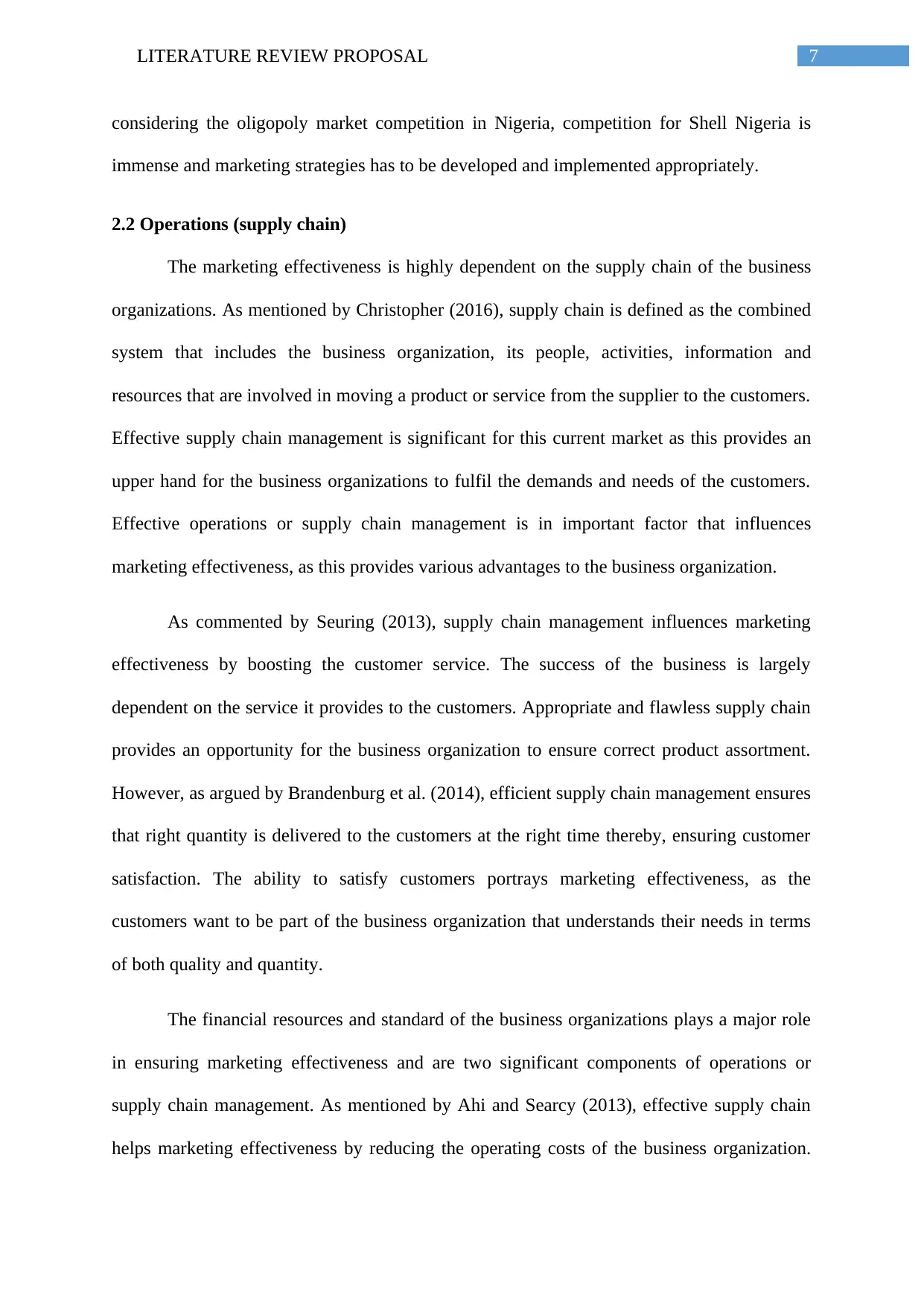
7LITERATURE REVIEW PROPOSAL
considering the oligopoly market competition in Nigeria, competition for Shell Nigeria is
immense and marketing strategies has to be developed and implemented appropriately.
2.2 Operations (supply chain)
The marketing effectiveness is highly dependent on the supply chain of the business
organizations. As mentioned by Christopher (2016), supply chain is defined as the combined
system that includes the business organization, its people, activities, information and
resources that are involved in moving a product or service from the supplier to the customers.
Effective supply chain management is significant for this current market as this provides an
upper hand for the business organizations to fulfil the demands and needs of the customers.
Effective operations or supply chain management is in important factor that influences
marketing effectiveness, as this provides various advantages to the business organization.
As commented by Seuring (2013), supply chain management influences marketing
effectiveness by boosting the customer service. The success of the business is largely
dependent on the service it provides to the customers. Appropriate and flawless supply chain
provides an opportunity for the business organization to ensure correct product assortment.
However, as argued by Brandenburg et al. (2014), efficient supply chain management ensures
that right quantity is delivered to the customers at the right time thereby, ensuring customer
satisfaction. The ability to satisfy customers portrays marketing effectiveness, as the
customers want to be part of the business organization that understands their needs in terms
of both quality and quantity.
The financial resources and standard of the business organizations plays a major role
in ensuring marketing effectiveness and are two significant components of operations or
supply chain management. As mentioned by Ahi and Searcy (2013), effective supply chain
helps marketing effectiveness by reducing the operating costs of the business organization.
considering the oligopoly market competition in Nigeria, competition for Shell Nigeria is
immense and marketing strategies has to be developed and implemented appropriately.
2.2 Operations (supply chain)
The marketing effectiveness is highly dependent on the supply chain of the business
organizations. As mentioned by Christopher (2016), supply chain is defined as the combined
system that includes the business organization, its people, activities, information and
resources that are involved in moving a product or service from the supplier to the customers.
Effective supply chain management is significant for this current market as this provides an
upper hand for the business organizations to fulfil the demands and needs of the customers.
Effective operations or supply chain management is in important factor that influences
marketing effectiveness, as this provides various advantages to the business organization.
As commented by Seuring (2013), supply chain management influences marketing
effectiveness by boosting the customer service. The success of the business is largely
dependent on the service it provides to the customers. Appropriate and flawless supply chain
provides an opportunity for the business organization to ensure correct product assortment.
However, as argued by Brandenburg et al. (2014), efficient supply chain management ensures
that right quantity is delivered to the customers at the right time thereby, ensuring customer
satisfaction. The ability to satisfy customers portrays marketing effectiveness, as the
customers want to be part of the business organization that understands their needs in terms
of both quality and quantity.
The financial resources and standard of the business organizations plays a major role
in ensuring marketing effectiveness and are two significant components of operations or
supply chain management. As mentioned by Ahi and Searcy (2013), effective supply chain
helps marketing effectiveness by reducing the operating costs of the business organization.
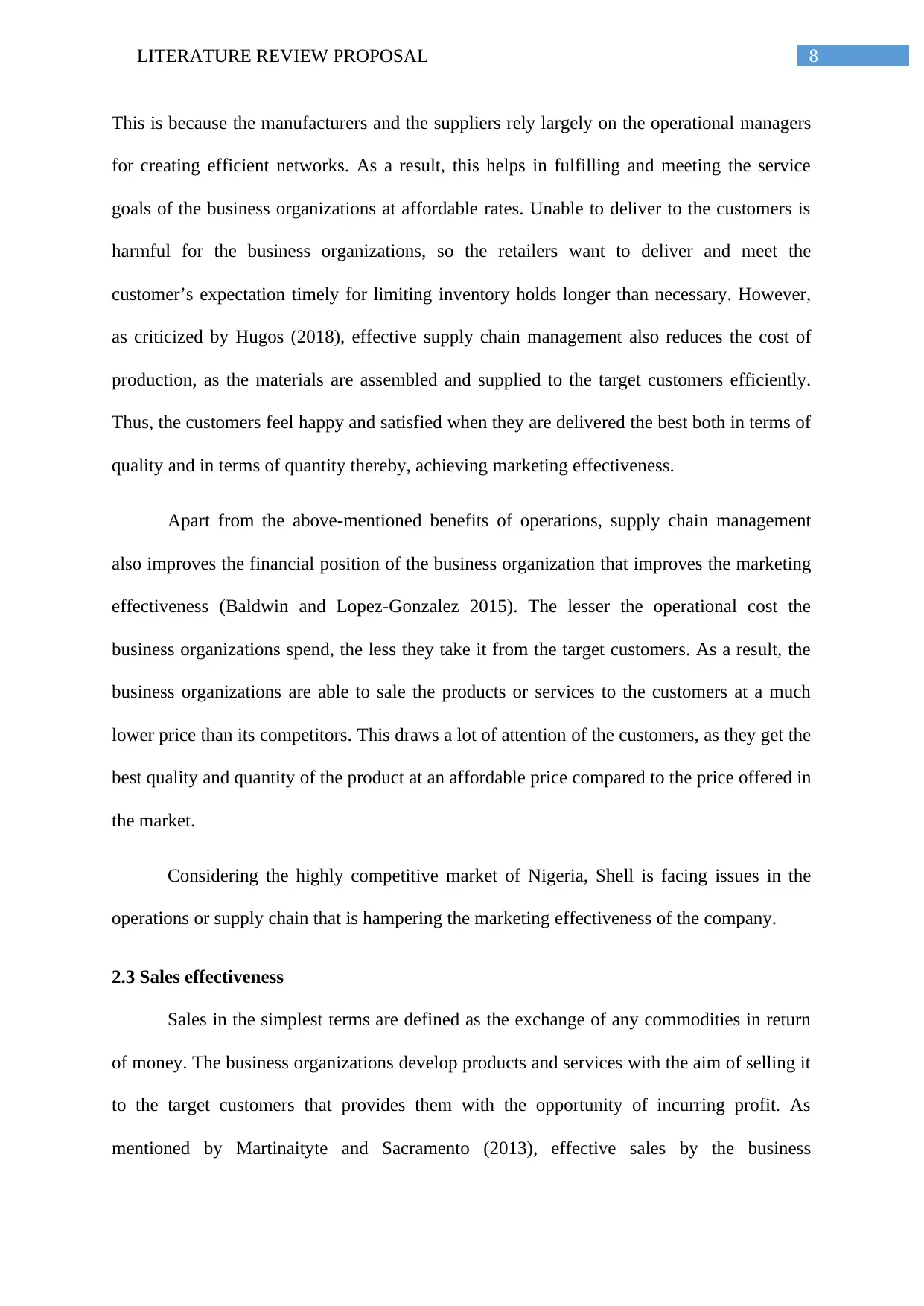
8LITERATURE REVIEW PROPOSAL
This is because the manufacturers and the suppliers rely largely on the operational managers
for creating efficient networks. As a result, this helps in fulfilling and meeting the service
goals of the business organizations at affordable rates. Unable to deliver to the customers is
harmful for the business organizations, so the retailers want to deliver and meet the
customer’s expectation timely for limiting inventory holds longer than necessary. However,
as criticized by Hugos (2018), effective supply chain management also reduces the cost of
production, as the materials are assembled and supplied to the target customers efficiently.
Thus, the customers feel happy and satisfied when they are delivered the best both in terms of
quality and in terms of quantity thereby, achieving marketing effectiveness.
Apart from the above-mentioned benefits of operations, supply chain management
also improves the financial position of the business organization that improves the marketing
effectiveness (Baldwin and Lopez-Gonzalez 2015). The lesser the operational cost the
business organizations spend, the less they take it from the target customers. As a result, the
business organizations are able to sale the products or services to the customers at a much
lower price than its competitors. This draws a lot of attention of the customers, as they get the
best quality and quantity of the product at an affordable price compared to the price offered in
the market.
Considering the highly competitive market of Nigeria, Shell is facing issues in the
operations or supply chain that is hampering the marketing effectiveness of the company.
2.3 Sales effectiveness
Sales in the simplest terms are defined as the exchange of any commodities in return
of money. The business organizations develop products and services with the aim of selling it
to the target customers that provides them with the opportunity of incurring profit. As
mentioned by Martinaityte and Sacramento (2013), effective sales by the business
This is because the manufacturers and the suppliers rely largely on the operational managers
for creating efficient networks. As a result, this helps in fulfilling and meeting the service
goals of the business organizations at affordable rates. Unable to deliver to the customers is
harmful for the business organizations, so the retailers want to deliver and meet the
customer’s expectation timely for limiting inventory holds longer than necessary. However,
as criticized by Hugos (2018), effective supply chain management also reduces the cost of
production, as the materials are assembled and supplied to the target customers efficiently.
Thus, the customers feel happy and satisfied when they are delivered the best both in terms of
quality and in terms of quantity thereby, achieving marketing effectiveness.
Apart from the above-mentioned benefits of operations, supply chain management
also improves the financial position of the business organization that improves the marketing
effectiveness (Baldwin and Lopez-Gonzalez 2015). The lesser the operational cost the
business organizations spend, the less they take it from the target customers. As a result, the
business organizations are able to sale the products or services to the customers at a much
lower price than its competitors. This draws a lot of attention of the customers, as they get the
best quality and quantity of the product at an affordable price compared to the price offered in
the market.
Considering the highly competitive market of Nigeria, Shell is facing issues in the
operations or supply chain that is hampering the marketing effectiveness of the company.
2.3 Sales effectiveness
Sales in the simplest terms are defined as the exchange of any commodities in return
of money. The business organizations develop products and services with the aim of selling it
to the target customers that provides them with the opportunity of incurring profit. As
mentioned by Martinaityte and Sacramento (2013), effective sales by the business
⊘ This is a preview!⊘
Do you want full access?
Subscribe today to unlock all pages.

Trusted by 1+ million students worldwide
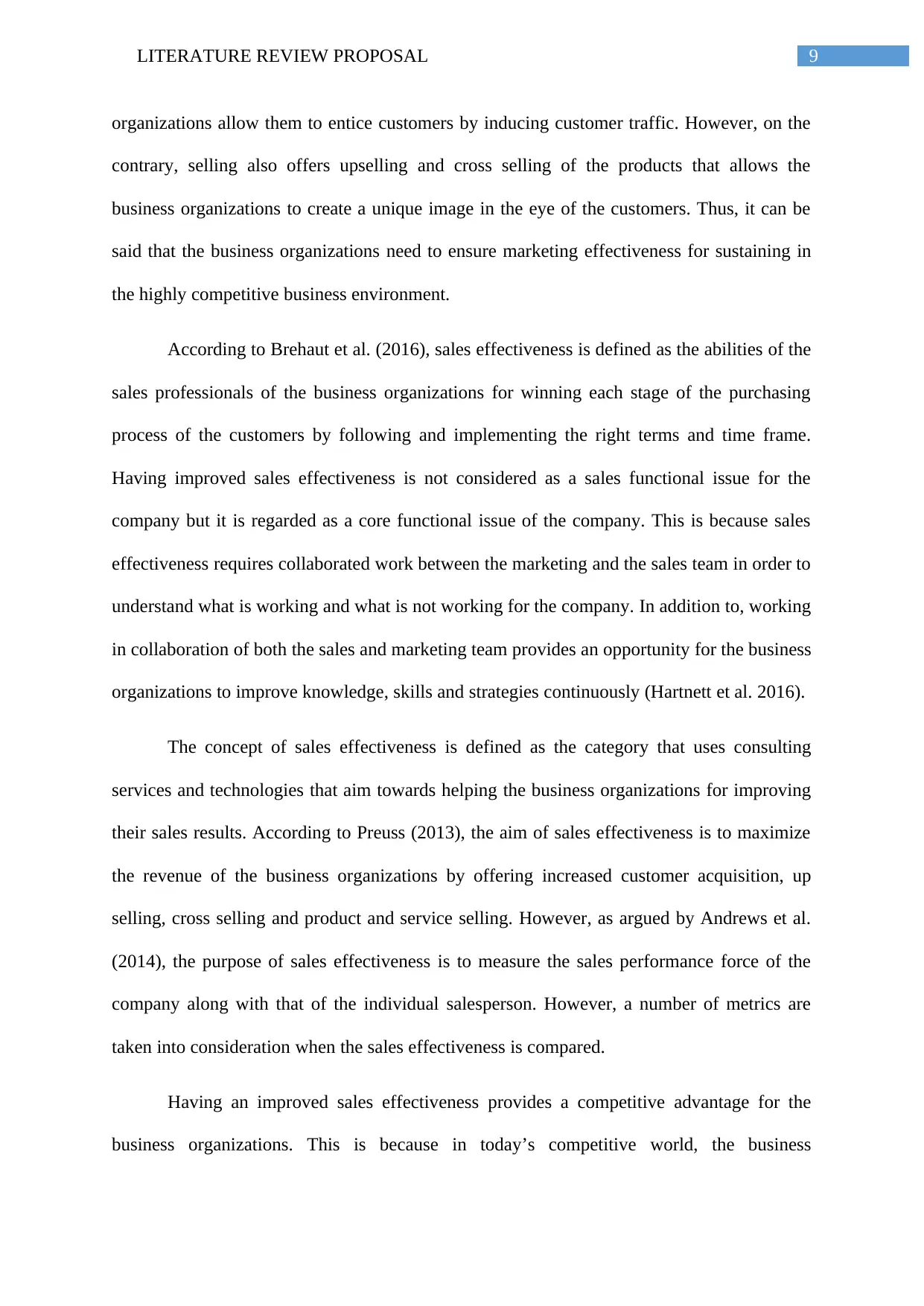
9LITERATURE REVIEW PROPOSAL
organizations allow them to entice customers by inducing customer traffic. However, on the
contrary, selling also offers upselling and cross selling of the products that allows the
business organizations to create a unique image in the eye of the customers. Thus, it can be
said that the business organizations need to ensure marketing effectiveness for sustaining in
the highly competitive business environment.
According to Brehaut et al. (2016), sales effectiveness is defined as the abilities of the
sales professionals of the business organizations for winning each stage of the purchasing
process of the customers by following and implementing the right terms and time frame.
Having improved sales effectiveness is not considered as a sales functional issue for the
company but it is regarded as a core functional issue of the company. This is because sales
effectiveness requires collaborated work between the marketing and the sales team in order to
understand what is working and what is not working for the company. In addition to, working
in collaboration of both the sales and marketing team provides an opportunity for the business
organizations to improve knowledge, skills and strategies continuously (Hartnett et al. 2016).
The concept of sales effectiveness is defined as the category that uses consulting
services and technologies that aim towards helping the business organizations for improving
their sales results. According to Preuss (2013), the aim of sales effectiveness is to maximize
the revenue of the business organizations by offering increased customer acquisition, up
selling, cross selling and product and service selling. However, as argued by Andrews et al.
(2014), the purpose of sales effectiveness is to measure the sales performance force of the
company along with that of the individual salesperson. However, a number of metrics are
taken into consideration when the sales effectiveness is compared.
Having an improved sales effectiveness provides a competitive advantage for the
business organizations. This is because in today’s competitive world, the business
organizations allow them to entice customers by inducing customer traffic. However, on the
contrary, selling also offers upselling and cross selling of the products that allows the
business organizations to create a unique image in the eye of the customers. Thus, it can be
said that the business organizations need to ensure marketing effectiveness for sustaining in
the highly competitive business environment.
According to Brehaut et al. (2016), sales effectiveness is defined as the abilities of the
sales professionals of the business organizations for winning each stage of the purchasing
process of the customers by following and implementing the right terms and time frame.
Having improved sales effectiveness is not considered as a sales functional issue for the
company but it is regarded as a core functional issue of the company. This is because sales
effectiveness requires collaborated work between the marketing and the sales team in order to
understand what is working and what is not working for the company. In addition to, working
in collaboration of both the sales and marketing team provides an opportunity for the business
organizations to improve knowledge, skills and strategies continuously (Hartnett et al. 2016).
The concept of sales effectiveness is defined as the category that uses consulting
services and technologies that aim towards helping the business organizations for improving
their sales results. According to Preuss (2013), the aim of sales effectiveness is to maximize
the revenue of the business organizations by offering increased customer acquisition, up
selling, cross selling and product and service selling. However, as argued by Andrews et al.
(2014), the purpose of sales effectiveness is to measure the sales performance force of the
company along with that of the individual salesperson. However, a number of metrics are
taken into consideration when the sales effectiveness is compared.
Having an improved sales effectiveness provides a competitive advantage for the
business organizations. This is because in today’s competitive world, the business
Paraphrase This Document
Need a fresh take? Get an instant paraphrase of this document with our AI Paraphraser
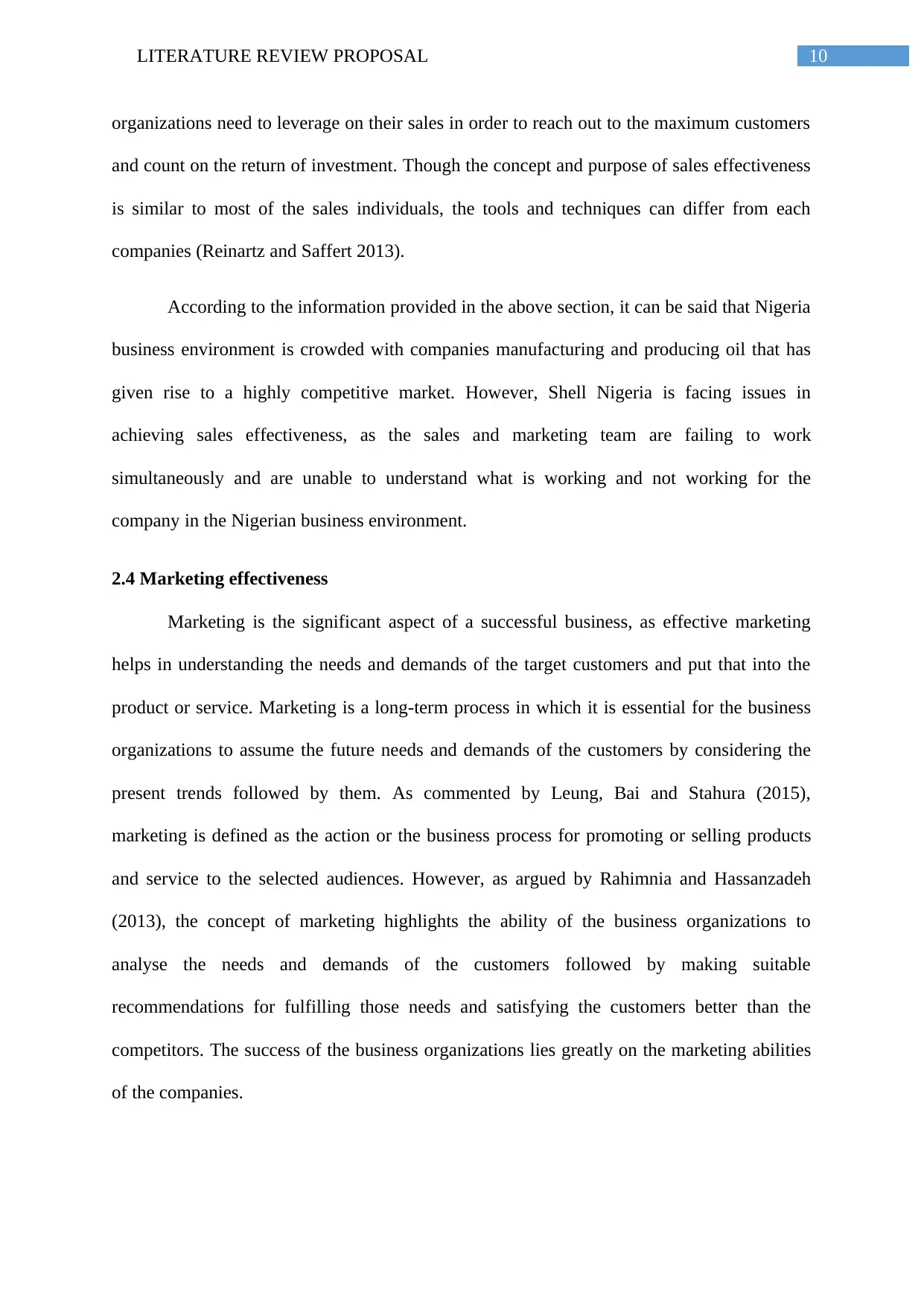
10LITERATURE REVIEW PROPOSAL
organizations need to leverage on their sales in order to reach out to the maximum customers
and count on the return of investment. Though the concept and purpose of sales effectiveness
is similar to most of the sales individuals, the tools and techniques can differ from each
companies (Reinartz and Saffert 2013).
According to the information provided in the above section, it can be said that Nigeria
business environment is crowded with companies manufacturing and producing oil that has
given rise to a highly competitive market. However, Shell Nigeria is facing issues in
achieving sales effectiveness, as the sales and marketing team are failing to work
simultaneously and are unable to understand what is working and not working for the
company in the Nigerian business environment.
2.4 Marketing effectiveness
Marketing is the significant aspect of a successful business, as effective marketing
helps in understanding the needs and demands of the target customers and put that into the
product or service. Marketing is a long-term process in which it is essential for the business
organizations to assume the future needs and demands of the customers by considering the
present trends followed by them. As commented by Leung, Bai and Stahura (2015),
marketing is defined as the action or the business process for promoting or selling products
and service to the selected audiences. However, as argued by Rahimnia and Hassanzadeh
(2013), the concept of marketing highlights the ability of the business organizations to
analyse the needs and demands of the customers followed by making suitable
recommendations for fulfilling those needs and satisfying the customers better than the
competitors. The success of the business organizations lies greatly on the marketing abilities
of the companies.
organizations need to leverage on their sales in order to reach out to the maximum customers
and count on the return of investment. Though the concept and purpose of sales effectiveness
is similar to most of the sales individuals, the tools and techniques can differ from each
companies (Reinartz and Saffert 2013).
According to the information provided in the above section, it can be said that Nigeria
business environment is crowded with companies manufacturing and producing oil that has
given rise to a highly competitive market. However, Shell Nigeria is facing issues in
achieving sales effectiveness, as the sales and marketing team are failing to work
simultaneously and are unable to understand what is working and not working for the
company in the Nigerian business environment.
2.4 Marketing effectiveness
Marketing is the significant aspect of a successful business, as effective marketing
helps in understanding the needs and demands of the target customers and put that into the
product or service. Marketing is a long-term process in which it is essential for the business
organizations to assume the future needs and demands of the customers by considering the
present trends followed by them. As commented by Leung, Bai and Stahura (2015),
marketing is defined as the action or the business process for promoting or selling products
and service to the selected audiences. However, as argued by Rahimnia and Hassanzadeh
(2013), the concept of marketing highlights the ability of the business organizations to
analyse the needs and demands of the customers followed by making suitable
recommendations for fulfilling those needs and satisfying the customers better than the
competitors. The success of the business organizations lies greatly on the marketing abilities
of the companies.
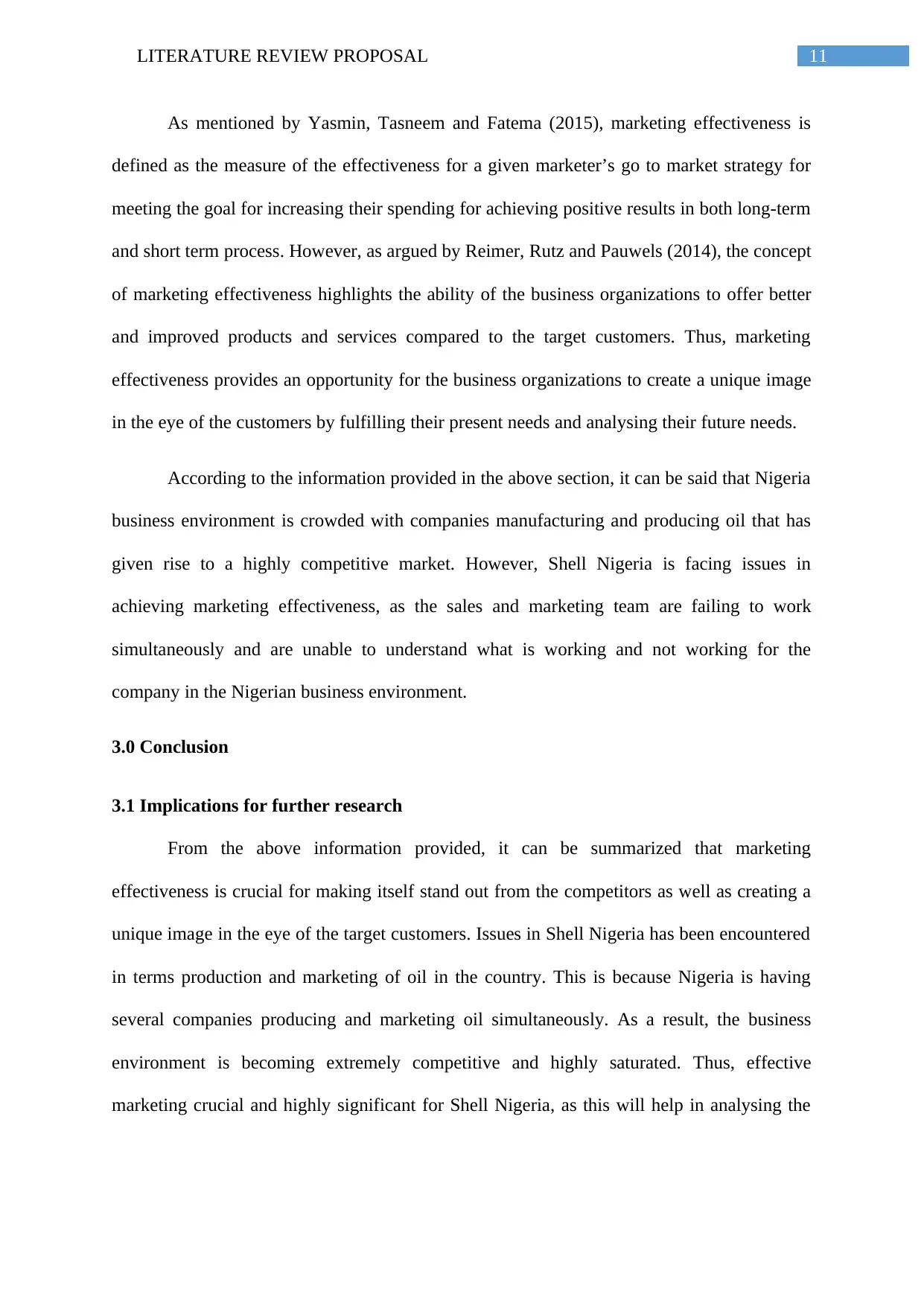
11LITERATURE REVIEW PROPOSAL
As mentioned by Yasmin, Tasneem and Fatema (2015), marketing effectiveness is
defined as the measure of the effectiveness for a given marketer’s go to market strategy for
meeting the goal for increasing their spending for achieving positive results in both long-term
and short term process. However, as argued by Reimer, Rutz and Pauwels (2014), the concept
of marketing effectiveness highlights the ability of the business organizations to offer better
and improved products and services compared to the target customers. Thus, marketing
effectiveness provides an opportunity for the business organizations to create a unique image
in the eye of the customers by fulfilling their present needs and analysing their future needs.
According to the information provided in the above section, it can be said that Nigeria
business environment is crowded with companies manufacturing and producing oil that has
given rise to a highly competitive market. However, Shell Nigeria is facing issues in
achieving marketing effectiveness, as the sales and marketing team are failing to work
simultaneously and are unable to understand what is working and not working for the
company in the Nigerian business environment.
3.0 Conclusion
3.1 Implications for further research
From the above information provided, it can be summarized that marketing
effectiveness is crucial for making itself stand out from the competitors as well as creating a
unique image in the eye of the target customers. Issues in Shell Nigeria has been encountered
in terms production and marketing of oil in the country. This is because Nigeria is having
several companies producing and marketing oil simultaneously. As a result, the business
environment is becoming extremely competitive and highly saturated. Thus, effective
marketing crucial and highly significant for Shell Nigeria, as this will help in analysing the
As mentioned by Yasmin, Tasneem and Fatema (2015), marketing effectiveness is
defined as the measure of the effectiveness for a given marketer’s go to market strategy for
meeting the goal for increasing their spending for achieving positive results in both long-term
and short term process. However, as argued by Reimer, Rutz and Pauwels (2014), the concept
of marketing effectiveness highlights the ability of the business organizations to offer better
and improved products and services compared to the target customers. Thus, marketing
effectiveness provides an opportunity for the business organizations to create a unique image
in the eye of the customers by fulfilling their present needs and analysing their future needs.
According to the information provided in the above section, it can be said that Nigeria
business environment is crowded with companies manufacturing and producing oil that has
given rise to a highly competitive market. However, Shell Nigeria is facing issues in
achieving marketing effectiveness, as the sales and marketing team are failing to work
simultaneously and are unable to understand what is working and not working for the
company in the Nigerian business environment.
3.0 Conclusion
3.1 Implications for further research
From the above information provided, it can be summarized that marketing
effectiveness is crucial for making itself stand out from the competitors as well as creating a
unique image in the eye of the target customers. Issues in Shell Nigeria has been encountered
in terms production and marketing of oil in the country. This is because Nigeria is having
several companies producing and marketing oil simultaneously. As a result, the business
environment is becoming extremely competitive and highly saturated. Thus, effective
marketing crucial and highly significant for Shell Nigeria, as this will help in analysing the
⊘ This is a preview!⊘
Do you want full access?
Subscribe today to unlock all pages.

Trusted by 1+ million students worldwide
1 out of 18
Related Documents
Your All-in-One AI-Powered Toolkit for Academic Success.
+13062052269
info@desklib.com
Available 24*7 on WhatsApp / Email
![[object Object]](/_next/static/media/star-bottom.7253800d.svg)
Unlock your academic potential
Copyright © 2020–2026 A2Z Services. All Rights Reserved. Developed and managed by ZUCOL.





